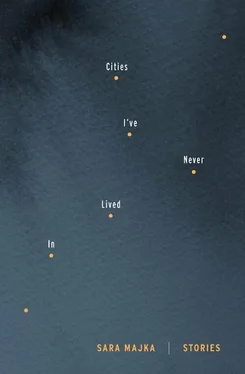I had come up with the idea years before — when I first became interested in soup kitchens. I made the plan to travel the United States, going to small interior cities and going to kitchens there. I had volunteered in kitchens in the past and had found it comforting. I would work for a few hours and then would sign my name and get in line and eat, scrunched over, not poor enough to eat there if I hadn’t worked, but not a volunteer doing it out of goodness. Lost, probably, in ways that made me more comfortable in places like those — the church halls, the Styrofoam plates, the trays, the gentle feeling of caretaking and cafeteria lines — and lost perhaps in ways understandable to those around me.
I didn’t get far in the trip, however, before I became unsure why I was doing it. My first city was Buffalo and I arrived late, by train, taking a taxi to the hostel. The next day I walked to a mobile kitchen that was supposed to be parked outside the library at 7:00 p.m., but it was already gone when I arrived. I decided to stay an extra night so that I could go to the kitchen the next day, at the time the kitchen now arrived. The next day I stood in line to get the plastic bag that held dinner. A woman carried a box with more food — Baggies filled with granola bars and crackers — and people took those as she passed. When she came to me, I said that I only wanted the food there, pointing to where dinner bags were being passed down. I was surprised to hear my voice, that vulnerability that was of such little help usually, but it was honest in that line, honest and understandable. No, it’s okay, the woman said gently, this is food, too. I took the bag of snacks, and, when it came time, took the plastic bag that held dinner.
I carried the food into the library. Holding the bags changed how I felt about myself. It made me feel more vulnerable or exposed or fragile. For a number of years I had been struggling to hold myself together, though I had worked to disguise this, and now carrying the thin bags made this visible, made people look at me. I walked around the library until I found the café. I asked the man working the register if I could eat there, and he said yes. Dinner was bland macaroni with tomato sauce and meatballs. There was also a turkey sandwich and cookies for the bus the next day.
After, I stood in the foyer. Windows overlooked the street where the mobile kitchen had been. It was gone now, and I felt the loss of it, as if I had not done it properly and wanted to try again. Others waited there. An older black man asked if I was waiting for a bus. No, I said. He then assumed I was waiting for a ride. No, I said, I’m just here.
I walked toward the hostel. It was overcast, rainy, and cold. The streets were mostly deserted. There was much about Buffalo that was difficult to put into words. It felt like a city that had been deserted and then, years later, been repopulated by the poor. Or maybe the poor had been in the city all along, but had waited to emerge. The main street was being ripped out and a metro ran through the rubble. Though the streets were deserted, there were always people in the metro car when it passed, so it felt like they, too, were leaving. All the metro stops — and there were many, every block or so along that street — piped music, and at first, walking the street, I didn’t know where the music was coming from. Then the metro passed and disappeared under the street. One man on the sidewalk said to his friends, There goes our metro to nowhere.
What struck me most were the decorations: a sweeping arch over one metro stop, a gold globe on a roof, the opera hall sign that lit up six stories into the sky. This had once been another place. And the signs made me lonely because they were built for another time and for someone else.
I thought of the cab driver who had picked me up from the train at one in the morning. He said I would know him by the dice. His name was Ed. Ed’s taxi service. He never turned around, just talked and drove facing forward. Blue light hit the sharp line of his cheek. I’d found that people who worked those jobs — the picturesque and hard jobs of the cities — were aware of what they were and were aware of what you were after, and often told stories as part of the service.
All drugs in here, he said as we drove through a boarded-up neighborhood. Last week a taxi driver, he said, in one of those white taxis you saw waiting by the train, was found murdered. It won’t be solved. What someone does — someone who needs money — is hail them — the taxi drivers or pizza drivers, because they have cash with them — the drivers need to be making change, so they’ll always have cash with them.
I imagined, as he talked, the fragility of those men, of Ed coasting through the quiet early morning, lit in blue. Got robbed one night, Ed said, then I became friends with a couple of black drivers to learn the tricks. Now you think about who to pick up, who not to pick up. He showed me where they were building the new houses, the new developments. All the old houses are past repair, he said.
Later, I read about the cab driver who had been shot and left in his backseat. Most articles were the same — giving the details of the death, and then the details of the funeral — but one writer interviewed several taxi drivers, calling them a close band of brothers. One man had rushed to the scene thinking it was one of his drivers, but it had been a different company. Another man talked about the additional security that people were calling for. He said that you could put in cameras, you could track the people, but in the end, the man in the article said, I walk in faith.
All day I sat in the lower bunk in my hostel, the only one in the room. A heating vent blew and from time to time I heard the sound of rain. Otherwise it was quiet. It was a relief whenever the vent turned on.
In Detroit I took a picture of a man on the street. I thought a lot about this. I wanted to take pictures of what I was seeing, but it didn’t feel right. Poverty was everywhere and was overwhelming. People lived in this poverty, and this life was filled with details that I wanted to hold on to, but I found it was passing too quickly. I walked the outskirts of Detroit, and black men wandered past as if drifting or lost in the landscape. I sat and waited for buses and people came up to me. They said simple things — good day, or don’t get hurt, or would I like a bag to sit on. Or they would ask if I knew where the Salvation Army was, or if I knew where the Greyhound station was.
In Cleveland, I was walking down a street filled with bistros and shops when a man hailed me. He was selling beauty products from a plastic bag and walked a block with me. He said he was from Detroit, but he meant Detroit Street in Cleveland. I bought bodywash for five dollars — a bottle of expensive, local bodywash — then he walked away. It occurred to me that I could have taken his picture. He had sadness deep in his face, but the surface of his face was buoyant, lit. It was too much to have the moment and then have the moment pass, and to be the only one who saw that face.
It was that way in Detroit when I passed a row of abandoned apartments near the hostel. Two long buildings faced each other across an empty field. White children played in the field, and parents stood in a sliver of doorway watching them. I wanted to take a picture, but I didn’t want to disturb the quietness of passing them.
When I finally took a picture, it was of a man begging near Slows Bar BQ. I had eaten and was carrying leftovers. A man sitting in a lawn chair on the sidewalk told me to be careful, to not bump into the garden. He was in front of a brightly painted wall, and before I could ask, he said, You want to take a picture? He moved out of the way. At my hesitation he said, Or you want me in it? You in it would be nice, I said. As I took the picture, he energetically held up his sign. I wanted to tell him that he didn’t have to do that, but instead I gave him change and asked, Do you mind that people take your picture? He said that he didn’t. People want a picture of the homeless, he said. Then it was clear that he wanted me to move along.
Читать дальше












